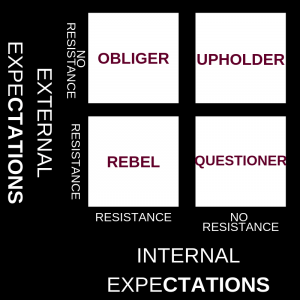About habit creation for Taijiquan & Qi Gong people
In my last post I told you that I am a bloody beginner. 15 years of Taijiquan and Qi Gong, and I am a beginner again. Because I have not practiced properly for months.
Well, practicing regularly is a habit. And last year a friend and I talked about habits. And she told me about Gretchen Rubin and the book “The Four Tendencies”*.
Gretchen Rubin discovered that some people find it really easy to create habits. And others don’t. She wondered: why is that?
And she started thinking about EXPECTATIONS. She discovered that there are external expectations and internal expectations.
An external expectation would be: your Taijiquan teacher tells you to “practice this move at home 10 minutes every day”.
An internal expectation would be you doing a new years resolution like “this year I will practice 30 minutes per day”.
Gretchen Rubin also discovered, that we react differently to these external and internal expectations.
Some people resist external expectations. I guess we all know these people who never do what others tell them!
And then there are some people who resist internal expectations. Like those who say “I really want to do this, but I never get myself to actually do it”.
If you combine these reactions you get 4 types, the Four Tendencies:

Before I talk about the different tendencies I want to point out: all tendencies have their benefits and their shortcomings. No tendency is better than another. This is just about getting to know oneself better!
You can take the free quiz to find out which tendency you are: Four Tendencies Quiz.
Now let’s talk about the tendencies. I am sure you know people in each category:
Upholders are those who just do as the teacher says. And they practice when they make up their mind they want to. And as I mentioned before: upholders do struggle, too, with certain aspects of their tendency! But basically, they do not resist expectations, they just do it.
Obligers are those who find it easy to do everything as long as they are accountable. They find it easy to go to classes because the teacher expects them to come. But they find it hard to practice at home alone.
Questioners are those who need reasons. They want to know “why do I need to practice this?”. They resist someone telling them “do it because I say so”. But if they understand the reasons and benefits, they are happy to practice regularly.
Rebels are the ones who resist ALL expectations. They don’t do what others tell them to do. They don’t do what they tell themselves to do.
I am a rebel.
I resist external expectations. I do not like being told “you have to do THIS”. Ask my mum, my husband, my teachers!
I resist my own internal expectations, too. I set a goal and the next day I’m like “naaah, I dont really want this”.
Being a rebel is quite exhausting. I am constantly fighting. No wonder I chose a internal martial art! I am always fighting internally.
BUT: knowing that my tendency is “Rebel” was quite a relief. When I did the quiz last year, after I got the results, I cried for 2 days. Those were tears of relief. Because it finally all made sense.
All the struggles of creating a habit suddenly made sense.
Because, all the tendencies have their shortcomings and their benefits. And the benefit of being a rebel is: I can do anything I want. I am capable of doing anything. Which is ironic, because I often do not do what I want. I struggle with creating habits.
But it’s not because I am undisciplined or lazy. It’s because the common habit creation strategies do not work for me.
Putting practice time into my calendar does not work for me. Having an accountability group does not work for me. Knowing all the reasons why practicing daily is so good does not work for me.
Luckily, Gretchen Rubin does not only talk about the tendencies. She also talks about the different strategies to create habits. Some strategies work better for some types.
There are even strategies for rebels.
I know that when I really really want something, I can do it.
At lightning speed.
And I really really want to practice again.
Watch me. Going at lightning speed while moving really slowly.
